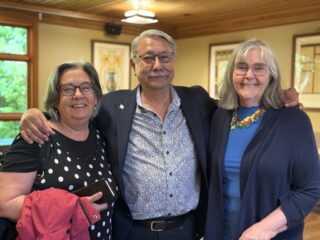Origins and the Story of the RFNG Logo
The Rebuilding First Nations Governance (RFNG) project (formerly Transitional Governance Project and Transforming Indian Act Governance Project) aims to provide applied research and analysis directed by First Nations governments who are working to master or to leave behind Indian Act governance. RFNG project partners include six First Nations and two Tribal Councils, six Canadian universities, three non-governmental organizations and 35 academic researchers and practitioners in Canada and the United States. The founding members are: Satsan (Herb George), Senior Associate with the Centre for First Nations Governance, Dr. Frances Abele, Professor of Public Policy and Administration at Carleton University and Catherine MacQuarrie, formerly the Senior Executive in Residence, Indigenous Government Programs with IPAC.
The vision for the Rebuilding First Nations Governance project arose from Satsan’s work in communities with the National Centre for First Nations Governance (predecessor to CFNG), witnessing the needs which First Nations communities identified. Satsan and Frances Abele had considered how to act out this vision for many years and were able to start moving forward with the help of Catherine MacQuarrie in 2016. Erin Alexiuk, a doctoral student at Waterloo, also joined the team to help drive the project forward.

A founding meeting was held May 5-6, 2016 in Ottawa, Ontario. Satsan had arranged the meeting with Catherine and Frances to build on their shared career-long commitments to education, research, and implementation of the inherent rights of Indigenous Peoples, particularly self-governance. The meeting identified preliminary research needs and priorities necessary for developing a Transitional Governance Model to help First Nation master and eventually move out from under the Indian Act. The first step would be to organize a Transitional Governance Think Tank in 2017 to bring together Indigenous scholars and practitioners, experts and representatives from First Nations. This was followed by a “Building Community” gathering of potential partner communities in July 2019, that helped put the finishing touches on a successful partnership grant application to the Social Sciences and Humanities Research Council to support the research over several years..
The story of the RFNG Logo

Rebuilding First Nations Governance (RFNG) is a national alliance of First Nation communities and Tribal Councils, academic researchers, and public service practitioners. It was created to support First Nations leaders and rights holders – through research and shared learning – to implement their inherent right to self-government by transitioning themselves out from under more than 150 years of colonial administration.
Our project encompasses a diversity of First Nations cultures, languages, and histories from coast to coast. Our focus is the little understood (but very important!) topic of governance. We asked Megan Currie, creative director of X-ing Design in Regina Saskatchewan, to work with us to design a symbol to represent who we are and what we’re about in a clean modern style, inclusive of all First Nations across Canada.
We challenged ourselves to get beyond stereotypical symbols to the deeper values that connect our communities. We wanted to explain the meaning of our work in ways that matter to the people and to convey the strength and resilience of our communities. In the work we do, it is necessary to draw the connection between our collective memory as healthy and successful nations before the arrival of the Europeans, with the power that is now in our hands to return to health and success through self-government.
The symbolism
One strong connection between all First Nations is the central importance of what many call “Mother Earth”. The core of our symbol contains elements from the land, sky, and water. Indigenous peoples are caretakers of Mother Earth and realize and respect her gifts of water, air, land, and fire.
Within the land are two hands representing the land keepers of the past and present handing over to the keepers of the future. They also signify the partnerships within our project and our collective willingness to share what we learn with others. Between the hands are Grandfather rocks, with memories and stories to share with those able to hear their ancestral voices.
The background contains two rectangles framing the half circle (sun) representing the longhouses on the coasts and the circle symbolizing the lodges and tipis of the interior. It also contains seven Grandmother moon cycles, reminding us that seven generations of our peoples have lived under the dark shadow of the Indian Act.
Grandfather sun represents a new day. Many First Nations practice sunrise ceremonies to express gratitude for the gifts of the earth and to begin the day in a good way. The sun also contains seven rays, representing the seven fires prophecies told by some First Nations. The Seven Fires surround the Eighth and final Fire. It is said that the Eighth Fire will bring political decolonization, cultural reclamation and resurgence, liberation, and peaceful coexistence. Within the fire are four figures signifying connection to the four aspects of the Medicine Wheel. It is at the centre of the logo, indicating the importance of building and sustaining community.
The Rebuilding First Nations Project honours the historical strength of our Nations. It recognizes the destructive hold that the Indian Act continues to have, and supports the implementation of Inherent rights, Treaty rights and Aboriginal title as the way to create a healthy and sustainable world for future generations. We are doing this work together to create new memories in the minds of our children.